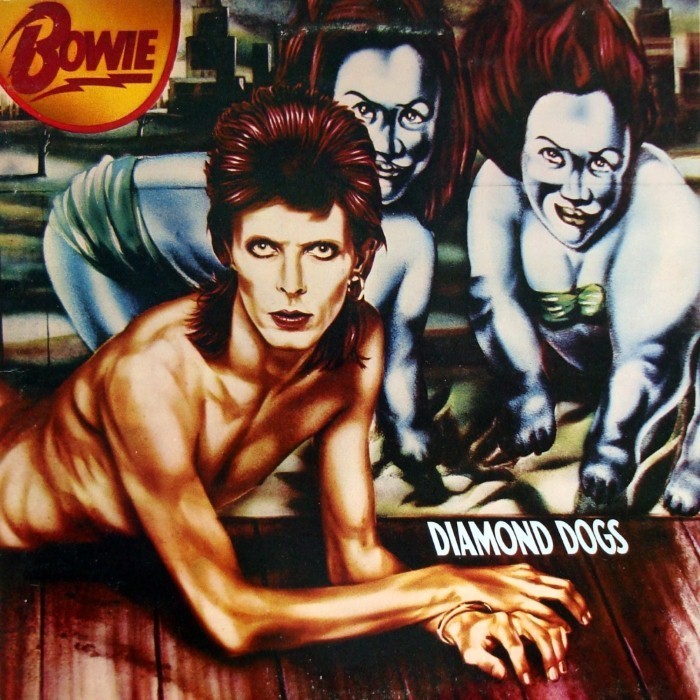Diamond Dogs by David Bowie

Diamond Dogs is a concept album by David Bowie, originally released in 1974 on RCA Records, his eighth album. Thematically, it was a marriage of the novel Nineteen Eighty-Four by George Orwell and Bowie's own glam-tinged vision of a post-apocalyptic world. Bowie had wanted to make a theatrical production of Orwell's book and began writing material after completing sessions for his 1973 album Pin Ups, but the late author’s estate denied the rights. The songs wound up on the second half of Diamond Dogs instead where, as the titles indicated, the Nineteen Eighty-Four theme was prominent.
Following 1973’s <i>Aladdin Sane</i>, David Bowie laid his Ziggy Stardust persona to rest, but its ghost still haunts <i>Diamond Dogs</i>, which pushes glam-rock pageantry to its musical and ideological breaking points. By the mid-1970s, the distress that seeped into Bowie’s <i>Aladdin Sane</i> songbook had become all-consuming: Where that album fixed his electric eye upon Vietnam War-era America, 1974’s <i>Diamond Dogs</i> was preceded by a week-long journey on the Trans-Siberian Express through Russia and Europe that provided Bowie with a front-row seat to totalitarian rule and post-war ruin. That experience spawned a conceptual vision that couldn’t be contained by a mere album: Bowie’s original plan was to stage a musical adaptation of George Orwell’s dystopian opus <i>1984</i>, elements of which were previewed in his theatrical prime-time NBC spectacular, <i>The 1980 Floor Show</i>. But after Orwell’s widow refused to sign off on the project, Bowie decided to approach similar themes of societal decay and inequity from a different angle, supplementing his initial Orwell-inspired compositions with a <i>Clockwork Orange</i>-esque narrative about a gang of impoverished inner-city ne’er-do-wells storming the palaces of the rich. Years before punk hit, Bowie was already anticipating the Johnny Rottens and Sid Viciouses of the world rising up to strike fear into the hearts of the establishment. But what this recombinant album lacks in narrative coherence, it makes up for in sheer audacity. “This ain’t rock ’n’ roll, this is genocide!” Bowie declares over canned crowd noise at the top of the marauding title track, drawing a discomfiting parallel between the omnipotent rock star lording over his crowd and the authoritarian dictator holding court at a rally. And from that playfully provocative starting point, <i>Diamond Dogs</i> embarks on a high-wire tightrope walk between sleazy excess and gobsmacking extravagance. On the one hand, the album finds its sturdy anchor in “Rebel Rebel”, an eternal glam-generation anthem that retrofits the hammering caveman rock of The Stooges for pop radio. But <i>Diamond Dogs</i> also features tantalising glimpses of the <i>1984</i> musical that never was, through elaborate multi-sectional vignettes—like the “Sweet Thing”/“Candidate” medley—that compensate for the departure of long-time guitar foil Mick Ronson by foregrounding Bowie’s swirling sax-work (not to mention the regal piano melodies of returning <i>Aladdin Sane</i> scene-stealer Mike Garson). And while <i>Diamond Dogs</i>’ closing three-song suite points to Orwell’s vision of the future, it ended up predicting Bowie’s own, with the chicken-scratched guitars, fierce funk grooves and mirror-ball-twirling strings of “1984” cracking open the portal to his next phase as pop’s consummate plastic soul-man.
